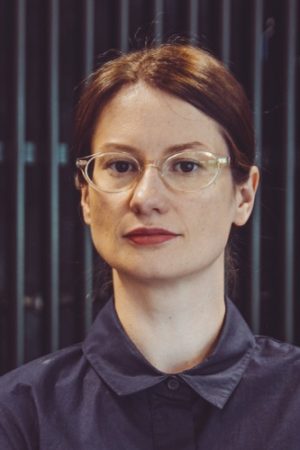Lidia Klein

Lidia Klein
Lidia Klein is an Assistant Professor in Architectural History, specializing in global contemporary architecture. Her current research centers on the political dimensions of postmodern architecture outside the Global North, specifically in South America and Eastern Europe. She earned her Ph.D. in 2018 from the Department of Art, Art History, and Visual Students (AAHVS) at Duke University and a Ph.D. from the Department of Art History at the University of Warsaw in Poland in 2013.
As of 2023, Klein is the author, editor, or co-editor of six published books and numerous articles on contemporary architecture. Her most recent book, Political Postmodernisms: Architecture in Chile and Poland, 1970–1990, was published by Routledge in Spring 2023. Her other book projects include the single-author study, Living Architectures: Biological Analogies in Architecture of the End of the 20th Century (Warsaw: Fundacja Kultury Miejsca, 2014) [in Polish], and edited books, Transformation: Polish Art, Design and Architecture After 1989 (Warsaw: Fundacja Kultury Miejsca, 2017) [in Polish], Polish Postmodernism: Architecture and Urbanism (Warsaw: 40000 Malarzy, 2013) [in Polish], and Making the walls quake as if they were dilating with the secret knowledge of great powers (Warsaw: Zacheta, 2012), co-edited with Michal Libera.
She has also authored essays that appear in various edited books, such as “One Size Fits All: Appropriating Postmodernism in the Architecture of Late Socialist Poland,” an essay co-authored with Alicja Gzowska in Second World Postmodernisms, edited by Vladimir Kulić (Bloomsbury, 2018) and “Postmodernist Revivalism and Architectural Gimmicks” in The Contested Territory: Architectural Theories after 1960, edited by Elie G. Haddad (Routledge, 2022).
Currently she is working on a book project on the crisis of modernist urban planning in Eastern Bloc countries.
EXPLORE HER RECENT WORK
Political Postmodernisms –
Architecture in Chile and Poland, 1970-1990
Klein’s publication argues that postmodern architecture can be radically rethought by examining its manifestations in Chile and Poland in the 1970s and 1980s. By investigating the cases of Chile during the neoliberal dictatorship of Augusto Pinochet and Poland during the late socialist Polish People’s Republic, the research project unfolds a less acknowledged narrative—one in which postmodernism is profoundly entangled with the political.
1980 in Parallax: Plaza de la Constitución, Post-Modernism, History and Propaganda in Pinochet’s Chile
This article published by the Jencks Foundation analyzes the Plaza de la Constitución in Santiago de Chile (1980) as an example of propagandistic use of postmodern architecture under Augusto Pinochet’s dictatorship. In Plaza de la Constitución – a design symbolically marking the announcement of the new constitution—postmodern tropes are used to fabricate a vision of history and society desired by the State, sending a powerful political message.
Spatial Transitions: Urban Space in Post-socialist Poland, November 2024
This paper delivered at 56th ASEEES Annual Convention examines the role of architecture in legitimizing new political and economic realities in post-socialist Poland. It maps spatial dimensions of transformation that can be observed in introducing new urban and architectural typologies and in using an aesthetic language very different from that of late modernism, which had been commonly identified with the socialist agenda in the Polish People’s Republic. This new image of Polish cities post-1989 cannot be described as a passive reflection or aesthetic equivalent of the changing economic reality; rather, we should see it as playing an active role in normalizing processes of aggressive privatization and high social costs that came with the rapid transition towards a market economy.